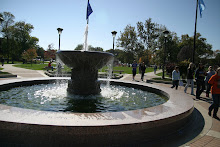by Brendan Dugan
The Bishop Simon Bruté College Seminary hosted the first lecture of its annual series Thursday Mar 22 at Marian University. Dr. William Portier, Distinguished Professor of Religious Studies at the University of Dayton, presented the lecture on Catholicism in the United States.
Father Bob Robeson initiated the lecture with a brief historic sketch about Bishop Simon Bruté, who lived in France and practiced medicine before coming to the US. Bruté taught at Mount St. Mary’s College in Maryland, where he became known as a distinguished theologian. Bruté later became the first bishop of the newly created Diocese of Vincennes in 1834, what is now the Diocese of Indianapolis, and established the college seminary, according to Robeson.
The lecture focused on historic phases of Catholicism in the US from the colonial era to the present. Portier began with the emigration of Catholics from a Europe rife with political and religious tensions during the 17th and 18th centuries, then progressed to the growth of the Church and its involvement in the labor movement in the US in the 19th and early 20th centuries.
The following periods Portier referred to as the “building and disillusionment” of the American Catholic subculture, from the advent of the Golden Age to the tumultuous late 60’s. By this time, Catholics had become “statistically indistinguishable from the rest of American culture,” Portier said.
Within the context of a pluralist society and the “disillusionment” of the ethnic Catholic cultural roots, Catholics began asking questions about identity, how their faith and traditions could remain distinct from those of other Christians.
“Some people got the idea that the Catholic Church was one Christian denomination among many…what it meant to be a Catholic was not as clear as it used to be,” said Portier.
“I never heard that term [Catholic identity] in the 1950’s,” said Portier. “No one ever had to worry about it.”
Since the late 60’s, the social process of “disaffiliation,” the non-association or leaving of faith traditions has grown – especially among Catholics.
Pointing to the dynamics of pluralist, consumerist American society, Portier emphasized this alarming “rise of the ‘Nones,’” a term derived from the religious affiliation option “none” on sociological surveys.
“One in ten Americans is a former Catholic,” said Portier. The top reason individuals cited for leaving the Church, according to a survey Portier referenced, is “I’m just not a religious person.”
In light of these troubling societal dynamics, Portier ended on a challenging, but hopeful note.
“The young and disaffiliated have to see that the fullness of life is found in the sacraments and the way of life in the church,” said Portier. “All these challenges and hopes are important...but in the end...they are ephemeral. Only one thing lasts, and that is Jesus Christ, the center of the universe and history.”
The Sophia Club, Theology, and History department sponsored the lecture.
skip to main |
skip to sidebar

The Knight Times is a student newspaper dedicated to serving the Marian University student community. Our goal is to inform the Marian community on campus, local, and global issues. We strive to report the stories that matter and take student opinions and comments into consideration. We want you to read, comment, and enjoy!
Welcome to

- The Knight Times
- The Knight Times is a student newspaper dedicated to communicating campus, local, and global issues to the Marian University student community. We want you to read, comment and enjoy!
Photos Taken By:
Michael Schrader
David Leszcynski
Michael Schrader
David Leszcynski
Blog Archive
-
▼
2012
(28)
-
▼
April
(13)
- Student government elects new officers
- Marian goes global
- Cycling: a global sport
- German students meet Eva Kor, Holocaust survivor
- Anatomy of the crucifixion
- Biology students study in Puerto Rico
- Nursing students serve in Honduras
- Shoeless students stir debate
- Marian: Building Bridges, Med school
- First Show Choir initiated at Marian
- Bird watching tours in the EcoLab
- Speaking Center opens doors
- Simon Bruté Lecture 1st Annual Lecture
-
▼
April
(13)
Stay Tuned for our NEXT Issue...
February 24 2012